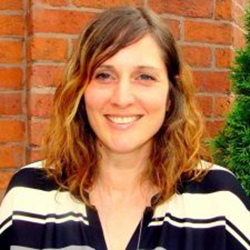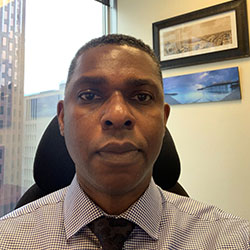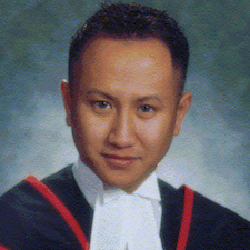Kristen Lwin

Executive Director, Practice and Research Together
Social Work
Kristen Lwin is serving as the Executive Director of Practice and Research Together, a national non-profit knowledge translation organization for child welfare. Kristen has led the development of a curriculum focused on promoting research evidence use in child welfare. Kristen has over twenty years of clinical experience with victims of crime and in the child welfare system and child welfare research and evaluation. Kristen's research is focused on how child welfare worker and organizational factors effect service user outcomes. Kristen has a Doctorate in social work from the University of Toronto.
What was your path to social work?
My education was not a direct line to social work. My first degree was in psychology, and after completing the degree I was not sure what line of work I wanted to get into. So, knowing I wanted to get into a helping profession, I entered the Assaulted Women and Children Counsellor Advocate Program at the college level. This diploma gave me the opportunity to work with victims and witnesses within the justice system - an amazing learning experience. Being in this type of work I was able to see the impact of systemic oppression and wanted to learn more. I knew that social work was the place for learning about how the environment - micro, meso, and macro - may impact people and how they experience the world. Both direct and indirect social work are so important to promoting well-being of individuals and families and equality among our communities.
Why did you want to become the ED of Practice and Research Together (PART)?
After working as a child welfare worker for many years and then working in child welfare research and evaluation, PART seemed like a logical fit for me. PART brings together child welfare work and research, using evidence-informed practice. It is so important for child welfare workers, or any social workers, to incorporate research into their daily practice. If we, as a field, are committed to ethical social work, research must be a part of our practice. Research is not a panacea, but we have a duty to access, understand, and think critically about whether it applies to our practice. Also, I love research!
What interested you in supervising students with the School of Social Work at York University?
I am interested in supervising students from all schools of social work. Each university provides a different perspective and offers something unique. In my experience, students from York University have the unique ability to apply theory to practice. Practice and Research Together (PART) is a knowledge translation and mobilization organization, so we are focused on developing resources for social workers, requiring the skill of applying what is learned in the classroom to the resources we create. Practicum students from York University have excelled in this area and demonstrated the ability to think critically.
What have been some of your favourite supervision moments?
Over the years, I have had so many favourite supervision moments that make me smile. One great moment was when a York student presented a critical thinking exercise that he developed, to a group of 120 people attending our conference. The exercise was amazing, and participants loved it. Another moment is when we were having our final supervision of the placement and our student wrote us a song! He sang us the song about what he learned at PART and about research and critical thinking. Lastly, one of my favourite moments are when students have a light bulb moment about critical thinking and the use of research in social work practice. The hope is that students realize the importance of incorporating research in practice and how to incorporate critical thinking into everything they do. This is the moment students feel empowered.
What has been some of the best advice you have provided to students about bridging practice and theory?
I think that the importance of critical thinking is the best learning that happens at PART. We are all about bridging practice and theory, which really comes from critical thinking. This is not so much a piece of advice, but rather a key process required for social work practice, direct or indirect. This learning comes from questioning one’s self – our learning, assumptions, beliefs, and how and whether this should be applied to our practice.
Sometimes the agencies we work for can be bureaucratic and feel top down at times. Is this something you have experienced? How do you manage and negotiate this for yourself and the students you supervise?
Similar to many social workers, I have experienced bureaucratic work environments. Learning to navigate bureaucracy has taken time, but what keeps me going is the knowledge that it is families accessing services that are ultimately impacted by our services. There are organizational processes that may be frustrating, but in the end will support families. These types of bureaucracies are time consuming, but we just must be patient. There are other bureaucracies that do not consider the well-being of families we serve – these are the processes that as social workers we need to question and ultimately link back to the ethics of social work.
What tips do you provide students you supervise about practicing self-care?
We are lucky that at PART we have a relaxed environment. We learn about self-care in school, which is important. In my experience, the most important thing I could do was stick to my ethics. For me, the most distressing aspect about direct practice was the systemic barriers that families faced in everyday life. Focusing on families’ strengths and building relationships allowed me to recognize the importance of my work.
What have you learned from the students you supervise? How have they inspired you?
I learn something from every student we supervise – to be more patient, to go slower, to take action, to be more explicit, and to recognize how we can make our work better in the moment. Every student has inspired me in a different way and has (hopefully) made me a better supervisor.
What advice would you give to new social worker graduates?
Be open – be open to different areas of social work, be open to a job you may not have considered when you began the social work program, be open to meeting people in various areas of social work, be open to not knowing. Take all of these experiences – good and bad – and learn from them. These experiences will shape you as a social worker and better equip you to serve the families in your community.
Browse more Alumni profiles
Graduate Program in Public Policy, Administration & Law
Master of Public Policy, Administration and Law (MPPAL)
2020
Senior Deputy Chief Building Official, Town of Caledon
Economics
Bachelor of Arts (BA)
Senior Counsel, Canadian Imperial Bank of Commerce (CIBC)
Graduate Program in Public Policy, Administration & Law
Master of Public Policy, Administration and Law (MPPAL)
2009
Assistant Commissioner, Government of Punjab Province, Pakistan




